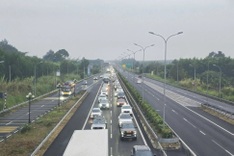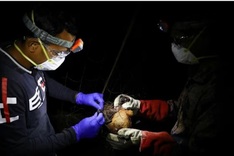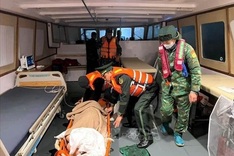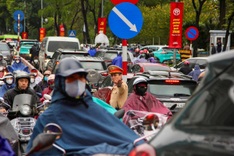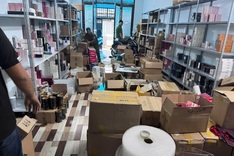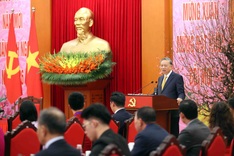Serious environmental pollution has shrunk the average lifespan of local inhabitants in many trade villages and economic zones by 10 years compared with the country’s overall life expectancy, the National Assembly’s Standing Committee has warned at its meeting yesterday.
 |
| Brick-kilns in Doan Hung District, Phu Tho Province emit harmful fume into the atmosphere Photo: Tuoi Tre |
The Committee released the warning in its report on environmental compliance with state regulations at trade villages and economic zones.
At the meeting, many deputies voiced their deep concern about the pollution problems in these places.
At present, Vietnam has more than 3,200 trade villages that employ over 11 million people, the NA’s Committee for Science, Technology and Environment said.
The levels of pollutants measured in villages engaged in food processing, breeding and animal slaughtering have exceeded the country’s allowable limits by dozens of times, the committee said.
In some villages, the contents of biological oxygen demand (BOD) and the chemical oxygen demand (COD) in wastewater were 200 times higher than the acceptable levels, it said.
In villages engaged in metal processing, the levels of harmful heavy metals, mercury salt, cyanide, discharged oil, and other harmful substances have been 1.5 to 10 times higher than the safety limits allowed.
Some villages set up a waste treatment system but did not operate it, citing high costs as the main reason.
In 15 coastal economic zones that were inspected, the pollution from organic substances and from oil and grease were 1-2 times and 4-6 times greater than the limits established by the authorities, respectively.
Many of them discharged untreated or poorly treated wastewater into the environment.
Many zones operated their waste treatment facilities only when they received inspectors.
Since the administrative penalty rates are far lower than the cost of investment in waste treatment systems or that of cleaning up the pollution, many zones prefer to pay fines rather than complying with the regulations.
“If the situation is not improved, the pollution will only get worse, and when it reaches a certain extent, the task of environmental restoration will be very hard and costly,” the committee said.
Violation must be strictly dealt with
Many deputies blamed the existing pollution at trade villages and economic zones on the lack of responsibility of relevant agencies in inspecting and handling environmental violations.
“Many instances were reported by the public and media of serious pollution problems caused by some businesses, leading to the mass death of fish or crops, but after conducting investigations, relevant authorities announced the pollution level to be within the allowable limits,” said deputy Nguyen Anh Son from Nam Dinh Province.
Thua Thien-Hue has punished many polluting trade villages while in Hanoi, the authorities have for a long time failed to handle the pollution caused by Duong Lieu trade village.
Nguyen Van Tien, deputy chairman of the NA’s Social Affairs Committee, said laws and regulations are applicable to all localities, but their enforcement varies from place to place, resulting in different outcomes.
Another deputy, Nguyen Minh Lam from Long An Province requested relevant agencies “to immediate suspend any economic entities that intentionally commit environmental violations.”
“Industrial parks (IP) or economic zones are allowed to operate only when they meet the requirements on waste treatment,” he said.
Le Minh Thong, deputy chairman of the NA’s Law Committee, said all companies in IPs or economic zones must meet technological requirements. If they cause pollution problems, their names should be publicized and their products be boycotted.
Le Phuoc Thanh, chairman of the Quang Nam Province People’s Committee, proposed the NA increase the budget for environment protection from the current 1 percent to 2 percent of the total budget revenue.
“To invest in the environment today is to take care of the health tomorrow,” he said.









